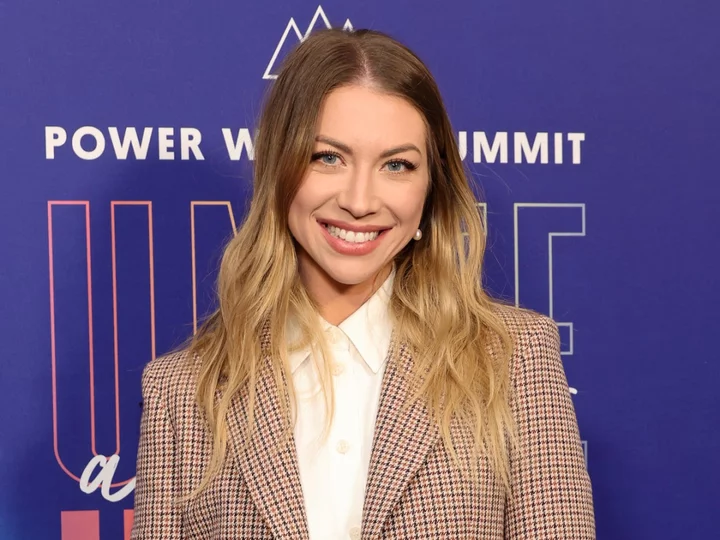
Vanderpump Rules alum Stassi Schroeder admits she wants to ‘try’ Ozempic after giving birth
Vanderpump Rules alum Stassi Schroeder has admitted she wants to “try” taking Ozempic after giving birth to her second child. The former reality star, 34, recently appeared on Alex Cooper’s Call Her Daddy podcast, where she spoke candidly about wanting to take the type 2 diabetes medication – which has often been prescribed as an “off-label” weight loss drug. “Oh, my God, I really want to try it when I give birth,” the Next Level Basic author told Cooper during Wednesday’s podcast episode. “The amount of times I’ve researched this being like, I mean, I think it’s safe and healthy. Like, I think it’s good for you. It’s like taking vitamins.” The Call Her Daddy host told listeners that “nothing that was said on this podcast” should be taken as serious medical advice,as she jokingly added: “Please do not listen to this.” Schroeder went on to explain why she’s curious about taking the once-weekly semaglutide injection, which works by mimicking a hormone that regulates appetite and creates the feeling of fullness, once she welcomes baby number two. “[After] my first pregnancy, I ate bone broth for dinner for six f***ing months after I gave birth, and I kind of don’t feel like doing that again. Like, I don’t want to,” she said. The Off With My Head author shares two-year-old daughter Hartford with husband Beau Clark. In March, Schroeder announced the couple were expecting a baby boy due in September. Much like Amy Schumer, Schroeder also called on fellow celebrities to be “transparent” and “honest” about some of the methods they take to lose weight. “Anyone who hears about Ozempic has to f***ing be curious,” she said during the podcast. “You are a liar if you tell me that you have not thought about it, thought about jumping on that train.” “Have I Googled Ozempic and what it would be like, and am I thinking about it? Yes, I am.” This week, actor and comedian Amy Schumer admitted to taking Ozempic last year to help lose weight. However, Schumer stopped taking the FDA-approved medication because of its side effects. “I was one of those people that felt so sick and couldn’t play with my son,” Schumer told host Andy Cohen on Watch What Happens Live. “I was so skinny and he’s throwing a ball at me and [I couldn’t].” Although the Trainwreck star ultimately decided that Ozempic wasn’t “livable” for her, she did take a moment to call out celebrities who have been “lying” about taking the once-weekly antidiabetic injection for weight loss. “Everyone’s like: ‘Smaller portions,’” she joked. “Shut the f*** up. You’re on Ozempic, or one of those things.” Ozempic has skyrocketed in use after people were reportedly prescribed the type 2 diabetes medication as an “off-label” weight loss drug. Due to its weight loss side effects, the increased demand has sparked a global shortage of Ozempic, leaving actual diabetics without the medication. While Ozempic is used for the treatment of diabetes, popular drugs like Wegovy and Moujaro are similar once-weekly semaglutide injections specifically approved for the treatment of obesity and weight loss. Last month, Stassi Schroeder’s former Vanderpump Rules co-star Brittany Cartwright shut down speculation that she lost weight by taking Ozempic. Fans began speculating that Cartwright was using the type 2 diabetes medication after she shared a selfie to her 1.6m Instagram followers, in which the reality star posed in a mirror wearing cycling shorts and a baggy T-shirt. “Totally ozempic,” one person claimed, as others remarked that it looked like Cartwright had “lost weight”. Cartwright then addressed the rumours directly, clarifying that the reason she may look slimmer is because of the iPhone camera setting she used to take the picture. “It’s actually the .5 zoom on the iPhone camera lol,” she wrote in the comments. Fellow Bravo personality and Real Housewives of Beverly Hills star Crystal Kung Minkoff has also said that although she hasn’t taken the drug, she has been tempted and “thought about it”. Read More Amy Schumer says she stopped taking Ozempic because of side-effects What is ‘Ozempic face’? Doctors warn about facial ageing side effect of diabetes medications Vanderpump Rules star Brittany Cartwright addresses rumours she’s taking Ozempic for weight loss Mother reveals ‘one regret’ after parent refused to give her child cake amid debate My teenager gets all their news from TikTok – should I worry? Jonnie Irwin ‘removes himself’ from family home amid terminal cancer battle
2023-06-15 07:46
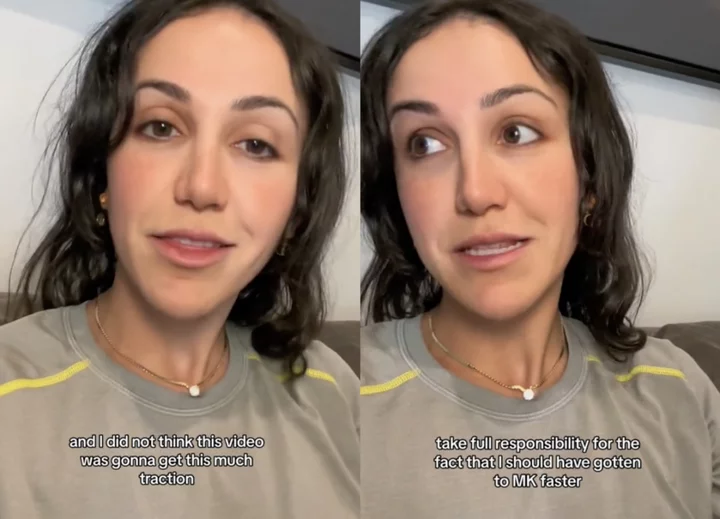
Mother reveals ‘one regret’ after parent refused to give her daughter cake amid viral debate
A mother has revealed the “one regret” she had after a parent refused to give her daughter a slice of cake. The parent, Kat Stickler, shared a follow-up video amid the now-viral debate about how her child joined a birthday party in a park. In her initial video – which has more than 13.7m views so far – Stickler said that a parent grabbed a plate from her daughter, MK, while she was on line for cake at the park. The woman allegedly told the three-year-old that she couldn’t eat the dessert, and that other kids at the party were “not her friends”. In her most recent clip, Stickler addressed how people had been reaching out to her, before sharing the one thing that she wished she did differently in the situation. “I wanted to take full responsibility for the fact that I should have gotten to MK faster,” she said, referring to when her daughter was waiting to get cake at the party. “That’s my one regret. That I did not get to her before she could grab the plate.” Stickler noted that her issue was “not with this person” who didn’t let “[her] kid have cake”. “She wasn’t invited to the birthday party. She had just met these kids,” she explained. “I get that, don’t give her cake.” The mother then explained that the main problem she had was with the way that the parent spoke to MK. “It’s getting down to a level and telling a three-year-old girl that those aren’t your friends,” she said. “It was cruel, unnecessarily, in my opinion. Like just tell her she can’t have cake, OK.” She added: “We don’t have to share our cake, but we should be nice to three-year-old kids.” As of 14 June, the follow-up video has more than 2.4m views, as TikTok users in the comments questioned people who didn’t understand that Stickler initially had a problem with the stranger’s remark to MK. “The fact that this wasn’t immediately clear to everyone from the beginning is CRAZY to me!!! #itwasneveraboutthecake,” one wrote, while another agreed: “Imagine needing to explain this to full adults….” @katstickler Also thank you all so much for all the love, support, and cake you’ve sent ????? ♬ original sound - Kat A third wrote: “Actually, the ONLY thing that mom should have said to MK is, ‘Please ask your mommy if it’s ok.’ In case of allergies.” Other people noted that they still would’ve given MK cake at the party, despite the fact that she wasn’t invited in the first place. “Idk… I would’ve gave her a piece of cake just because that’s how I grew up. If we had enough we gave, always,” one wrote. “Sure but also I’ve never been to a party where there wasn’t half a cake left after everyone already had what they wanted,” another added. In her initial video posted last week, Stickler sparked a viral debate when she revealed that MK introduced herself to a group of children at a party in a park. “She’s one of the group right now. They’re welcoming her with open arms,” she said. “Or, so I thought.” As MK joined the line of kids getting cake, Stickler said that she decided to follow her “to make sure it’s OK, as a formality”. “Honestly, I was like, obviously it’s OK. It’s cake. It’s a massive cake. There’s lots of leftover pieces,” she explained. @katstickler No cake for me thanks, I’m full…of rage? ♬ original sound - Kat However, Stickler then shared that the party host stepped in and stopped her daughter. “The mother takes the plate away from MK, and gets down to her level, says: ‘You cannot eat this cake, OK. This is not your birthday party. These are not your friends. Where’s your mother?’” Speaking to Today last week, Stickler noted that after this situation happened, she took her child to get ice cream. She also said that MK was “totally fine” after hearing the parent’s comment. “People have been asking me, ‘What did you say to the mom?’ The mom was literally the least of my concerns,” she explained. “I was worried about MK.” The Independent has contacted a representative for Stickler for comment. Read More Mother hit with deluge of abuse for taking toddler’s packed lunch to a restaurant Mother sparks viral debate for ‘shaming’ parent who refused to give her daughter a slice of cake Mother and six daughters wear their wedding dresses out to dinner: ‘Yearly tradition’ Mother sparks debate over parent who wouldn’t give daughter cake Drew Barrymore slams tabloids that claimed she ‘wished’ her mother was dead Drew Barrymore speaks out about parents and how she financially supports her mother
2023-06-15 05:50
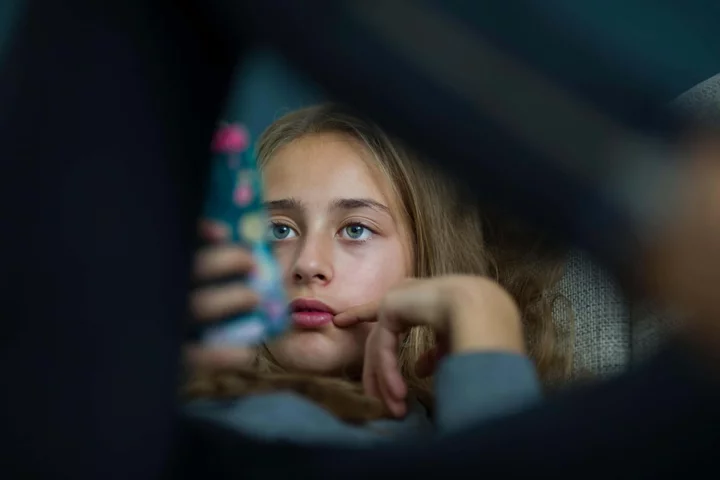
My teenager gets all their news from TikTok – should I worry?
Journalists are no longer the gatekeepers. The reality is that many young people are now bypassing the websites and apps of traditional news outlets and seeking information on social media platforms, including TikTok. It’s the ‘fastest growing social network’, according to the Reuters Institute Digital News Report, and new research has found that 20% of 18-24 year olds use the app solely to find their news. While a massive 44% of that age group use the short-form video hosting service for any and every other purpose. The younger generation have “little interest in many conventional news offers oriented towards older generations’ habits, interests, values, and instead embrace the more personality-based, participatory, and personalised options offered by social media”, said Reuters Institute director Rasmus Nielsen. Under 18s are big users too, so for parents whose teens get their news via TikTok, what do you need to understand about the social network and the evolution of digital media literacy? What is TikTok? Every so often a new app emerges and redefines the way we use social media. It’s what TikTok went and did in 2016. Starting as a small niche social media network – founded by Chinese tech giant Zhang Yiming – that attracted lip-synching teens as a short-form video hosting site, it almost knocked Facebook off its perch, and blew up during the coronavirus pandemic to a mega global platform. Do news organisations share news on it? Yes, they do. In many ways, traditional news organisations were forced to join TikTok to avoid being left behind, reach new and younger audiences and ensure they are continuing to find creative ways to pivot in a constantly evolving digital space. “Given the popularity and high engagement level, it’s not surprising that TikTok has become an important news platform for younger audiences, and it makes sense that news organisations are using it,” said Mark Brill, a senior lecturer in Future Media at Birmingham City University. “This, however, is a continuation of an existing trend. For well over a decade social media such as Facebook has been the primary news source for under 25s.” Anna Lee, founder at the Fr. App, added: “We can see that Gen Z individuals are turning to TikTok for any and all searches. While the funniest sound bites and newest dance trends will always have a home on TikTok, you can also equally expect to find videos explaining an arbitrary housing act.” How is it shared? There are various types of videos that can be shared on TikTok. Alongside the short bite-sized videos sharing the latest news, you can share trending sounds, things creators have posted, or videos with friends, family, and your larger community within TikTok or through other social media platforms. Videos can also be shared directly to other users, as long as the user has allowed for it. How do algorithms work? The TikTok algorithm is a recommendation system that determines which videos will appear on your (unique and highly personalised) For You page, which is also known as the homepage. Brill, who has 25 years of experience applying emerging technologies to engage audiences, said: “Much of the success of TikTok is the way that their algorithm decides which videos to show their users. TikTok’s system is based entirely on their interests and previous viewing. “This ‘more of what you like’ approach means that users spend more time each month in TikTok than any other platform. In the UK it adds up to over 27 hours per user per month and 23 hours globally. It shows how the platform’s algorithm can be highly addictive.” Is it OK that TikTok is how young people learn about what’s happening in the world? Some experts believe it is important for young people to be taught digital literacy at an increasingly earlier age – especially with the prevalence of fake news and artificial intelligence and its ability to forge fake articles and pictures. “Users of TikTok and all other social media apps must understand how to evaluate every piece of information they come across,” Lee said. “All parents worry about their child viewing harmful content on the internet. However, most leading internet providers provide extensive parental controls, including blocking and filtering unsuitable content.” Should they be encouraged to look elsewhere? For Brill, there are both benefits and challenges from using social media as a news source. He also cites the recent Reuters Institute report, which noted that TikTok users tend to look for good-news stories, avoiding the ‘doom scrolling’ found in web-based internet sites, which can have a negative impact on mental health. “The big question with social media sources, however, is that of veracity. A lack of fact checking and or acknowledgment of authoritative sources makes it difficult to identify fake stories and information. The short-form video format does not bring an in-depth analysis, where opinions are often presented as fact,” he said. “Perhaps the biggest challenge for TikTok users is with the algorithm itself. By giving more of what they like, it leads to confirmation bias that reinforces existing perceptions.” While child and behavioural expert Amanda Jenner, would encourage parents to tell their children to look elsewhere. “I am not a believer in directing children to learn through TikTok at all. Children can easily become addicted to social media and [it] can quickly escalate and [they could] be looking at other things they shouldn’t be watching. “I genuinely do feel parents need to be worried. I would encourage parents to set an age where it’s acceptable to have TikTok (over the age of 13 preferably) and have a parental control app so you can monitor and control what both they are seeing and the amount of time they spend on [it]. They need to be safeguarded.” Who knows what social network will be the next big thing but right now it’s difficult to get young people to migrate to another platform. Read More Charity boss speaks out over ‘traumatic’ encounter with royal aide Ukraine war’s heaviest fight rages in east - follow live How to take care of pets in the heat Struggling with menopause symptoms in the heat? An expert shares tips Men and women with migraine both have increased risk of stroke – study
2023-06-15 00:16
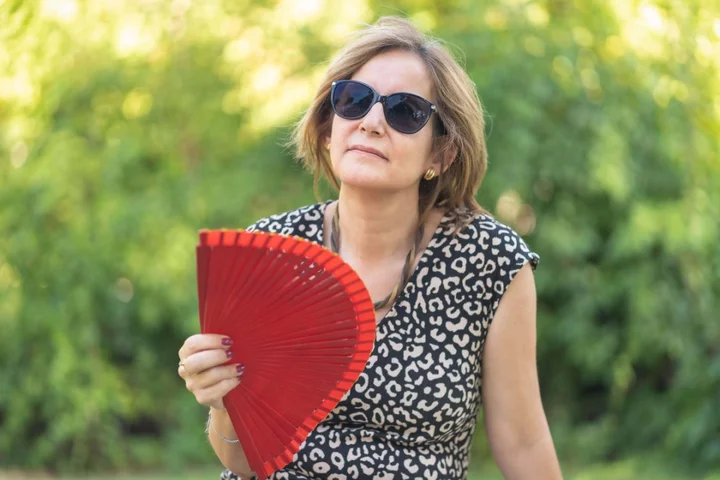
Struggling with menopause symptoms in the heat? An expert shares tips
Heatwaves can be uncomfortable at the best of times, but what if you’re already having hot flushes? Dr Naomi Potter, founder of Menopause Care and co-author of bestselling book, Menopausing, with Davina McCall, points out that eight in 10 people who go through menopause experience symptoms like hot flushes – a sudden surge of heat, often accompanied by redness and sweating. Night sweats and trouble sleeping are also common during perimenopause and menopause – not the sort of things you want to be dealing with when a heatwave hits. “The increasing temperatures can make hot flushes and night sweats worse, and make it harder to cool down when you do experience them,” says Potter, explaining that the lack of oestrogen associated with menopause affects the part of the brain that helps regulate body temperature. “If you’re already hot and sweaty, then having a night sweat or hot flush can just make everything worse and uncomfortable.” Here’s her advice for getting through the summer heatwaves… Travelling “Public transport can be awful at the best of times in the heat, especially when travelling on tubes, trains and buses where you’re cramped in, so if you experience a hot flush while travelling, it can be extremely unpleasant,” Potter says. “Try carrying water and a small fan, to give some comfort in these moments, if just for a short relief.” If you can, invest in a water bottle designed to keep liquids cold, so you’ll always have something cool to sip when you need to. Be drink savvy Speaking of drinks, Potter also suggests trying to limit alcohol, coffee and sugary beverages, especially if menopause symptoms are proving troublesome. Iced tea and water are ideal options. “During the summer, you’re more likely to be dehydrated, and alcohol, coffee and fizzy drinks worsen dehydration,” she explains. “So it’s worth bearing that in mind and staying hydrated with water.” Sleep Menopause might already be impacting your mood and energy levels, so sleepless nights can be a double whammy. “In the case of night sweats, you’ll often experience broken and interrupted sleep, which has a knock-on effect and impact on lifestyle and work the next day,” says Potter. “Create a cool sleeping environment by wearing light breathable bed clothes and have a spare by the bed in case you wake up sweaty, so you can change without having to properly wake up to find new clothes,” she suggests. Plus, a well-positioned bedroom fan will be your summer best friend. Dress light It goes without saying that clothing also affects temperature – so if hot flushes are bothering you, tweaking your wardrobe could certainly help. Potter suggests dressing in “lightweight, breathable fabrics” such as cotton or linen. Plus, a light pair of cycling shorts/long knickers under skirts and dresses can help massively with sweating and discomfort at this time of year. Get the right support Heatwave or no heatwave, menopause doesn’t have to mean suffering in silence and just soldiering on if symptoms are impacting you. “If somebody is having symptoms, then it is definitely worth seeing their GP because there’s lots that can be done,” says Potter. “And if you have a menopause-friendly workplace, it is definitely worth talking to [managers] because with recently headlines, many workplaces are much more supportive of the menopause. “I think it’s vital that conversations like this continue,” Potter adds. “Without speaking about experiences, then there is no way for people to realise that this is a normal life event, and there is help if it is required.” Storing HRT in the heat Finally, if you are taking hormone-replacement therapy (HRT), make sure it’s being stored correctly when temperatures soar. “Most HRT should be stored at room temperature. If this is the case with yours (it will say on the side of the packaging), do not refrigerate or freeze it. Instead, storing it in a cool dark place, away from direct light, should be fine,” says Potter. You will want to keep it away from excessive temperatures though – basically anywhere that can get particularly hot when it’s sunny, such as inside cars, on window ledges. “And aircraft holds,” Potter adds, “where temperatures are unknown and can rise rapidly.”
2023-06-14 18:48
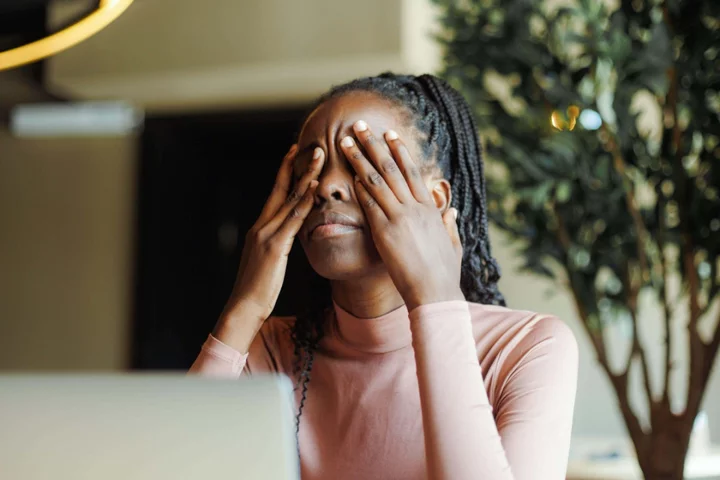
Men and women with migraine both have increased risk of stroke – study
Women and men who experience migraines have an increased risk of having the most common type of stroke, research has suggested. Additionally, women alone may carry a further risk of heart attack and haemorrhagic stroke (bleeding in or around the brain). People diagnosed with migraine are believed to have a higher risk of experiencing a heart attack or stroke before the age of 60. Migraine was associated with a similarly increased risk of ischemic stroke among young men and women Cecilia Hvitfeldt Fuglsang, Aarhus University Previous research had suggested the increased risk of ischemic stroke – when a blood clot blocks a blood vessel to the brain – mostly affects young women. However, it was unclear whether women with migraine also carry a higher risk of heart attack and haemorrhagic stroke compared to men. Cecilia Hvitfeldt Fuglsang, of Aarhus University, Denmark, and her team looked at Danish medical records collected from 1996 to 2018, from people aged 18 to 60. They identified men and women with a history of migraines and compared their risk of a heart attack and ischemic and haemorrhagic stroke before the age of 60 to the risks faced by people in the general population without migraine. Hvitfeldt Fuglsang said: “Migraine was associated with a similarly increased risk of ischemic stroke among young men and women. “However, migraine may be associated with an increased risk of myocardial infarction and haemorrhagic stroke only among women.” The findings suggest both men and women with migraine had a similarly increased risk of ischemic stroke. However, women with migraine may also carry a slightly higher risk of heart attack and haemorrhagic stroke, compared to men with migraine and the general population. Women are more greatly impacted by migraine, especially since the condition is predominantly diagnosed in women, the researchers suggest. The researchers point out that since they used prescription drug records to identify patients with migraine, they may have missed untreated people, which could have resulted in an underestimation of the contribution of migraine to these health problems. The findings are published in the Plos Medicine journal. Read More Charity boss speaks out over ‘traumatic’ encounter with royal aide Ukraine war’s heaviest fight rages in east - follow live Less than half of children ‘have received a meaningful financial education’ Harry Potter star Miriam Margolyes makes British Vogue cover debut aged 82 Toff: Drinking mindfully is a gift to yourself
2023-06-14 17:57
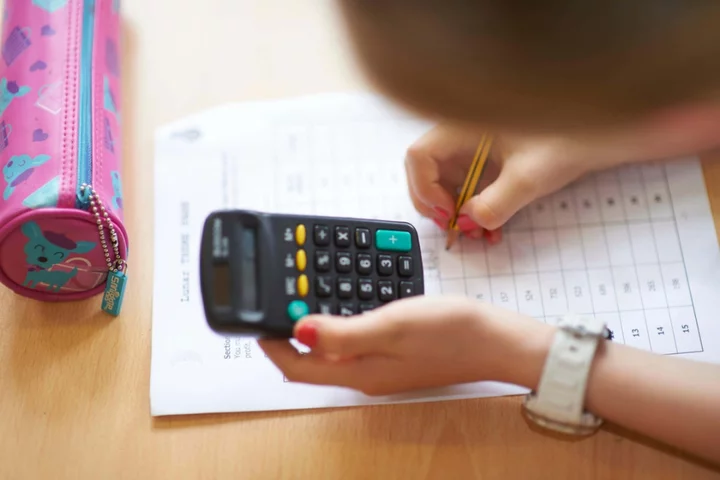
Less than half of children ‘have received a meaningful financial education’
Less than half (47%) of children and teenagers aged seven to 17 have received a meaningful financial education, according to a Government-backed body. The Money and Pensions Service (MaPS) estimates from its findings that around 5.4 million children across the UK do not have the money skills they will need in adulthood. Children living in social housing, rural areas and in lower income households were found to be less likely to have received a meaningful financial education. And children with parents or carers with mental health conditions tend to be less likely to have received a meaningful financial education than the UK average, the findings indicate. The measure of meaningful financial education is based on the percentages of young people who recall receiving financial education at school that they considered useful, and/or received regular money from parents or work, with parents setting rules about money and handing over responsibility for some spending decisions. Research was conducted for MaPS between late summer and autumn 2022 across the UK by Critical Research, among more than 4,700 children and young people aged seven to 17 and their parents or carers. The proportion of children and teenagers found to have received a meaningful financial education is similar to 2019, when the figure was 48%. The report said: “When interpreting these results, it is worth remembering the disruption to education and normal life caused by the Covid-19 pandemic potentially limited opportunities for children to receive a meaningful financial education at school and/or home over the last three years. According to the latest findings, a third (33%) of children recall learning about money in school and finding it useful, and nearly a quarter (24%) have received key elements of financial education at home. It is worth remembering the disruption to education and normal life caused by the Covid-19 pandemic Money and Pensions Service report Only 10% reported having both, suggesting that children and young people tend to receive meaningful financial education either at home or at school and not as “joined-up” financial education, the report said. Younger children aged seven to 11 continue to be less likely to have received a meaningful financial education than older children aged 16 to 17, according to the report. Children in Scotland are the most likely (52%) to have received a meaningful financial education, the report indicated, followed by those in Wales (51%), England (46%) and Northern Ireland (43%). Those in Wales (79%) are more likely than those living in the UK (71%)as a whole to receive regular money from parents/carers or work, according to the research. As part of its UK strategy for financial wellbeing, released in 2020, MaPS is aiming for two million more children aged five to 17 to receive a meaningful financial education by 2030. It is urging parents to talk to their children about money and combine it with everyday experiences, such as food shopping, budgeting and wages from a part-time job. Our experiences in childhood prepare us for adulthood and learning about money is no different Sarah Porretta, Money and Pensions Service To help with this, MaPS offers free resources such as “talk learn do“, an online tool that helps parents to start the conversation. The MaPS, which is sponsored by the Department for Work and Pensions (DWP) and funded by levies on the financial services industry and pension schemes, added that teachers, school leaders and governors should work together to deliver financial education in classrooms. It is also calling on financial services and funders such as charitable trusts to increase their investment in the delivery of financial education. Sarah Porretta, executive director at MaPS said: “These figures will alarm everyone in financial education because more than five million children could be going without. “Our experiences in childhood prepare us for adulthood and learning about money is no different. It becomes a part of daily life and our financial decisions can bring real benefits and profound consequences, so it’s crucial to learn from a young age. “The race is on to educate the nation’s children and everyone, from banks and building societies to foundations and financial institutions, has a big part to play. “Parents and schools can also make a huge difference by combining money skills with everyday experiences, both inside and outside the classroom.” Read More Charity boss speaks out over ‘traumatic’ encounter with royal aide Ukraine war’s heaviest fight rages in east - follow live Harry Potter star Miriam Margolyes makes British Vogue cover debut aged 82 Toff: Drinking mindfully is a gift to yourself Should you sleep naked? Heatwave myths debunked
2023-06-14 17:52
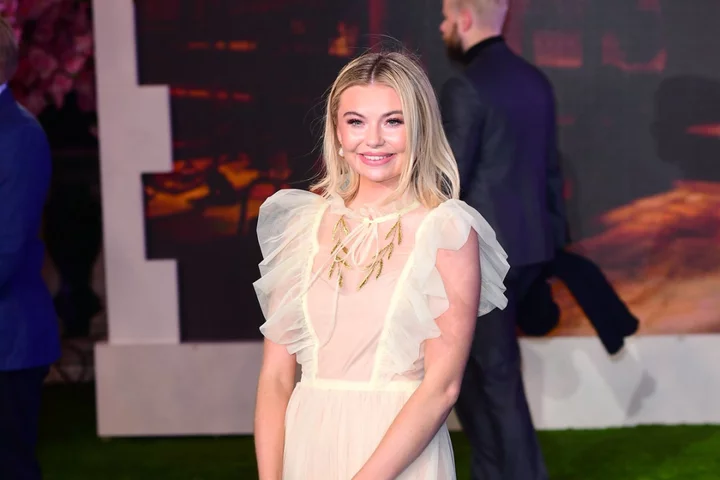
Toff: Drinking mindfully is a gift to yourself
When you think back to Made In Chelsea’s heyday, it seemed to be all champagne, kisses, debauchery and parties. But Georgia Toffolo, 2017 Queen of the Jungle and close pal of Stanley Johnson, says she often wasn’t drinking champagne at all. “We were always photographed with glasses of champagne in our hands, but mine was normally a non-alcoholic version,” the 28-year-old explains. “I don’t know whether people really know this.” At that time, the nation’s relationship with alcohol was in the spotlight, and how well we looked after our wellbeing became more important. Things began to change around her, says Toffolo. “People became more aware of their habits – both negative and positive. And as I was in my early 20s, I was able to ride that wave. “My attitude to wellbeing has changed hugely. I try to get balance and moderation, which is a constant battle, whether I am looking at how I eat, drink, work, or exercise. In my early 20s, it was so manic and I tried to work all the hours God sent, so the theme of my mid-20s has been trying to find moderation,” she explains. That moderation has become pertinent to her drinking habits. “I am a mindful drinker. I have been drinking since I was 18, but over the past three years, I have really tried to be more mindful.” She’s not the only one. According to new research by Harrogate Spring Water, 61% of adults are intending to try drinking in moderation in the coming months – a campaign Toffolo is supporting by debuting a new 0% summer cocktail, The Royal Raspberry Spritz, at Royal Ascot on Tuesday, June 20, at The Harrogate Spring Water Mindful Drinking Bar. A lot of people, Toffolo says, “are interspersing alcoholic drinks with non-alcoholic drinks, which is exactly what I do. “Ascot is like my Christmas. I go every day of every year but it can be a really long week,” she explains. “People go racing for so many different reasons, but you want to be on flying form. I drink loads and loads of water, feel super hydrated and feel great the next day. I spruce it up with a bit of basil or elderflower.” And because she sticks to mindful drinking, hangovers are a thing of the past, says Toffolo. “It doesn’t feel like it’s a chore, it doesn’t feel like I am losing out on anything, it is a gift to yourself. My mindset and my relationship with alcohol is so much healthier.” Read More Charity boss speaks out over ‘traumatic’ encounter with royal aide Ukraine war’s heaviest fight rages in east - follow live Should you sleep naked? Heatwave myths debunked 7 hay fever hacks to ease your symptoms this summer The pests you really don’t want invading your garden and how to deter them
2023-06-14 16:22
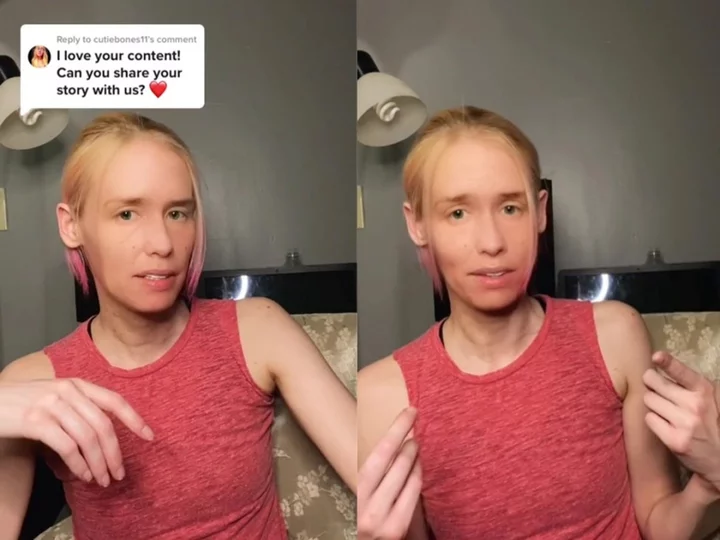
Woman who was pronounced dead for three minutes due to heatstroke describes what experience felt like
A woman who says she was pronounced dead for three minutes after battling with heatstroke has reflected on the experience, and the “strange anomalies” she has experienced since. When Jade, 36, visited a friend during a summer afternoon in Green Bay, Wisconsin, she didn’t expect for her life to be hanging in the balance only hours later. According to Jade, on the day in question, the temperature reached 89.6F, and with the high humidity, it made it feel “unbearable.” Soon after, she started experiencing frequent bouts of nausea, dizziness, dry mouth and exhaustion, which caused her to collapse on the living room sofa. As Jade was rushed to the hospital, medics pronounced her dead for three minutes and said the culprit was heatstroke. Now, in a bid to raise awareness, she’s shared her story on TikTok, where she’s received more than 191,000 views and over 20,000 likes, and where she said the experience has made her “unafraid” of death. “I had experienced an extreme fear of dying prior to this incident, but when it actually happened, I had zero fear,” the content creator, from Wisconsin, told NeedToKnow.co.uk. “I remember feeling consistently yucky and really gross. I was rundown, lethargic and sick to my stomach, with my mouth bone dry. “I went out to smoke and the moment that I finished and stood up, I knew I was in trouble. My priority immediately became getting back inside and I don’t think I understood at this point that I was dying, but I did understand that I was going down.” Jade recalls stumbling into the apartment and slumping onto the couch, before making a gurgling sound. She said: “Everything must have happened in a matter of moments, but it felt like much longer and this profound feeling of utter sickness hit me like a tonne of bricks. My head felt like it was inflating, yet my entire body as if it was shrinking. I had never known anything like it before. “It made me completely okay with dying because I wanted to sleep forever. Then, everything went black and that was the moment I knew I was about to pass away.” Jade was rushed to St Vincent’s hospital via ambulance, where she was revived via a defibrillator. As she arrived, she fell in and out of consciousness, but imaging tests of her head were carried out, along with blood tests and electrocardiograms, a test to check the heart’s rhythm. Over the next four days, she received injections to prevent blood clots and soon, medics told her she had been pronounced “dead” for three minutes on arrival with heatstroke. In the clip, she reflects on the experience and the “weird” occurrences which have happened to her since. Users flocked to the comments to share their reactions, with many detailing their own similar experiences. “I fainted TWICE that summer,” one person said, while another said: “I was pregnant that summer. The heat was HORRIBLE!!!” “Your story was very interesting. Glad you’re safe,” another person added. “Was it scary? What did you see? I really panic about the thought of death,” someone else asked. Jade was born with Wolff Parkinsons’ White and postural tachycardia syndrome, which both cause abnormalities with increased heart rate. Often, she feels like she’s going to “throw up” her heart and sometimes experiences extreme shakiness as well as fainting spells. Due to this, she finds intense heat triggers these episodes and while her near death experience in July 2011 hasn’t made these worse, she believes they were a contributing factor. “My symptoms are still mild, but I have been getting new ones, such as a low grade fever and muscle weakness,” she said “I’m not sure if these are related to the heatstroke. “I’m still waiting for a final diagnosis, as this has only occurred after my incident, but I will always fight for myself and my life.” Since then, Jade has also suffered with frequent seizures, which she had never had prior to the incident. She said: “At first, I thought it was heatstroke again, but I just passed out and doctors believe it’s because I’m still so exhausted from all the anxiety of almost dying. But, I have been admitted a few times for these and I’ve had tests such as MRIs and more blood work done, as well as seeing a neurologist and I’ve been diagnosed with epilepsy. “Now, I don’t have them so much, but I’ve been in touch with other near death experience survivors who said they had seizures for a while after, but then they suddenly stopped.” Jade has also experienced other “strange anomalies” such as not being able to wear regular watches, as they would stop working once she put them on. She said: “It wasn’t something that happened before and the only watches that are safe are expensive smart watches. I’ve given up on them entirely, but vape pens also shut down even with a full battery. “I’ve also had a lot of spooky things happening, such as hearing voices and seeing things that aren’t there. Sometimes it’s been whispers or dark hazy figures and I began recording my home because I was petrified that I was losing it. I believe this is telling me that life continues after death.” She continued: “I feel like I’m in a special club and it’s made me learn how to take better care of myself, as well as valuing life more. I don’t live in fear of death and I know that when my time comes, any fear will melt away like it did before. “The biggest lesson I’ve learned is that it is absolutely true what they say - the fear itself is always worse than the thing we actually fear.” Read More What is the difference between heat exhaustion and heat stroke? How to keep your pet cool and healthy during a heatwave How to tell if you’re seriously dehydrated, as UK temperatures soar
2023-06-14 06:59
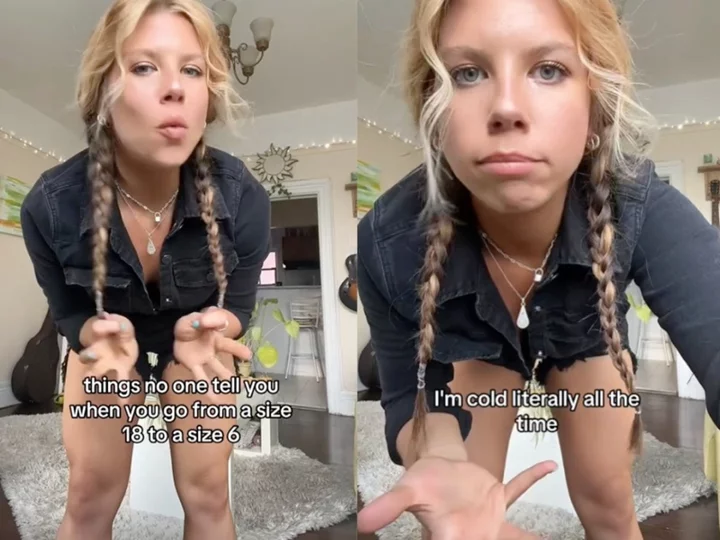
Woman who went from size 18 to size six shares surprising things ‘no one tells you’ about weight loss
A woman who went from a size 18 to a size six has shared some of the surprising things “no one tells you” about losing weight. Meg Stier, an actor and motivational speaker living in New York City who goes by the username @megmackenzies on TikTok, revealed some of the things she wishes she’d known “before [she] lost a bunch of weight,” such as that she would be cold “literally all the time,” in a video posted to the platform on Sunday. In the candid clip, Stier began: “[These are] things no one tells you when you go from a size 18 to a size six. And to be clear, there was nothing wrong with me when I was a size 18, and there’s nothing wrong with me at a size six.” Stier then reflected on the changes, many of which were negative, that she’s experienced as a result of her weight loss, with the TikToker revealing that, in addition to constantly being cold, she’s realised that “losing weight didn’t solve all of [her] problems,” there are days where she liked her body more when she was “bigger,” and that there’s a “lot of skin”. “I’m literally cold all the time. I’m just cold, always,” Stier said, before telling viewers: “Some days, I liked my body a lot more when I was bigger.” According to Stier, she’s also found that “people treat you differently” when you lose weight, and “skinny privilege is a thing”. “People started to respect me a lot more when I lost weight, which is just disgusting,” she continued, before moving on to some of the physical changes. “There’s a lot of skin. There’s a lot of skin,” she said. @megmackenzies It’s a learning curve #nyc #bodypositivity #weightloss #bodyacceptance #broadway #lifestyle #performer ♬ original sound - Meg Mackenzies Stier said she’s also found that her weight loss has become “the main topic of conversation” everywhere she goes. “Instead of my successful career, my education, or anything else about me,” she said. The TikToker concluded the video with a final surprising change to her body, with Stier expressing her surprise to find that her feet got “smaller” after losing weight. “My feet got smaller. I’m almost an entire shoe size smaller than I was,” she said, before adding: “Make it make sense.” In the caption of the TikTok, which has since been viewed more than 2.8m times, Stier acknowledged that her weight loss has been a “learning curve”. The video has resonated with viewers, with many praising Stier for talking candidly about the topic, while others shared their own similar experiences with weight loss. “Size 18 to two here. You forgot jewellery, rings and watches had to be resized. But yes to everything else!!” one person wrote, while another said: “Everyone thinks it’s so weird when I say my feet shrunk when I lost weight!! Always cold here too!” “I have literally experienced ALL of this! I went from a 22 to a two. So. Much. Skin.” someone else wrote. Many viewers also revealed they can relate to Stier’s experience with “skinny privilege,” with one person writing: “Girl same. I went from a size 20 to a size four. I RELATE. The skinny privilege blew my mind.” Another person wrote: “It is fascinating how I was ignored in stores when I was heavy but greeted enthusiastically when thin.” In a follow-up video, Stier opened up more about the concept of “skinny privilege,” with the TikToker sharing examples of the ways she is treated now as a size six versus when she was a size 18. @megmackenzies Anyone else experince these things? #bodyacceptance #nyc #bodypositivity #performer #lifestyle #weightloss ♬ original sound - Meg Mackenzies After clarifying that the video was not an “attack on skinny people,” Stier said that “skinny privilege” has meant that “people look me in the eye when they talk to me,” and that she can buy clothes in her size at any store. According to Stier, she’s also noticed a change in how people react when she speaks. “When I speak, people tend to listen more,” she said, before adding: “Well, I’m a woman, so men still talk over me, but, in general, people listen to me more than when I was larger.” Stier also revealed that she began to experience success in her career “the moment [she] lost weight,” despite not becoming “more talented, smarter or better at [her] job”. “I just looked different,” she said. The TikToker said she is no longer “judged” by what food she orders in a restaurant, or when she eats in public, and can go to the gym without others giving her a “‘good for her, she’s trying’ face”. “People considered me unmotivated, unhealthy and generally just lazy because I was bigger,” Stier said, before adding: “Those are three words that no one would ever use to describe me now and my lifestyle really hasn’t changed that much.” In the video, Stier then acknowledged that there is a “serious bias against fat people” that is “hard to fully grasp” unless you’ve “lived on both sides of the spectrum”. “Skinny privilege is a thing and even I find myself taking advantage of it. We need to change the way we view people because fat doesn’t mean bad and skinny doesn’t mean good,” she said. “People are just people. Their actions and their intentions are what make them good or bad, not the way they look.” Speaking to The Independent about her decision to make the initial TikTok, and whether she expected the viral response, Stier revealed that she has created the video “so many times over the last few months but never posted it because [she] didn’t want to be judged”. However, Stier was ultimately encouraged to share the video after seeing the number of people on TikTok “struggling with body acceptance and weight loss”. “After seeing so many people on TikTok struggling with body acceptance and weight loss I figured it would be worth sharing!” she explained. In regards to the viral reaction to the video, Stier said she was “most shocked” by the number of people the TikTok resonated with. “What I am most shocked about is how many people are saying ‘YES! ME TOO!’ It’s a conversation that has been needed for a long time and I’m grateful the online community has been so positive in letting me join that conversation,” she said. As for what she hopes viewers take away from the video, Stier said she wants to impart a “sense of community and honesty”. “It’s SCARY to talk about your own body on the internet. We spend so much time being told not to post things that don’t show us in a positive way (Photoshop, bad angles, no makeup etc.) But I want to encourage people to share the good and the uncomfortable,” she said. “Making these conversations more normal is how we stop the negativity that is constantly being thrown at people for the way they look or the number on the scale.” Read More Amy Schumer says she stopped taking Ozempic because of side-effects I tried anti-bloating pills for two weeks, and now I know the gassy truth Influencer calls out advertisements for weight-loss drugs in New York City subway stations: ‘Dystopian’ Schoolboy almost dies from swallowing magnets for TikTok challenge Woman shares honest review of New York City apartment TikTok mom slammed after making 5-year-old son run in 104 degree heat
2023-06-14 04:59
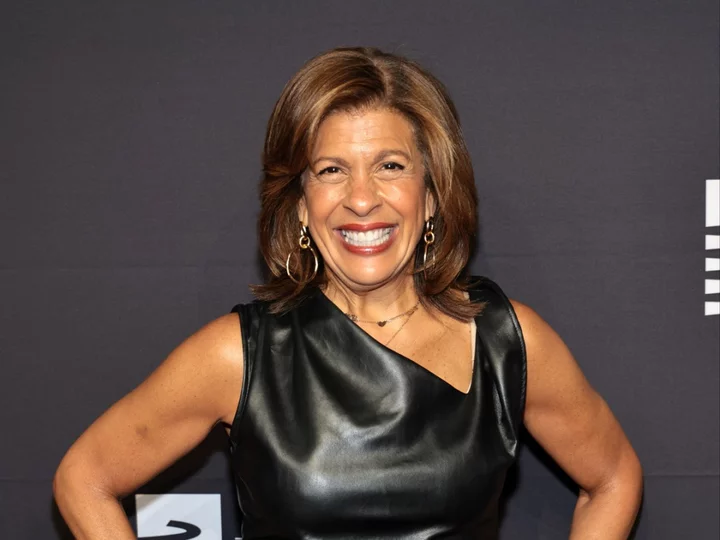
Hoda Kotb, 58, admits she ‘sometimes’ worries if she’ll see her daughters get married
Hoda Kotb has opened up about her fears of ageing and missing out on parenting milestones as she raises her two daughters: Haley Joy, six, and Hope Catherine, four. The 58-year-old NBC anchor discussed her anxieties about getting older during a recent episode of Bethenny Frankel’s Just B podcast. While speaking to the entrepreneur and former Real Housewives of New York City star, Kotb detailed her approach to parenting as an older mother to young girls. “I do have it sometimes,” Kotb said, when asked by Frankel if she has “anxiety” about ageing. “My dad died when he was 54, 55. I always think that the foundation he laid down was good for me. It helped me in my life.” Kotb was a junior in college at Virginia Tech when her late father, Abdel Kotb, died of a heart attack in 1986 at age 51. The Emmy-winning journalist became a first-time mother in 2017 when she adopted her eldest daughter Haley with ex Joel Schiffman. However, Kotb admitted that she “sometimes does the math” when thinking about being present for her daughters getting married or having children of their own. “I look at my mom, who’s 86, and I think to myself, ‘OK, what’s the difference here between me and her? 30 years. OK, that’s kind of good,’” Kotb said. “So I add 30 to Haley and I add 30 to Hope. And I think to myself, won’t that be spectacular? I can do that.” The Today host added, “Wouldn’t that be amazing? Do I get to see them get married? Maybe. That would be really good. Or do I get to see them have a child? Maybe. That would be really good.” While Hoda Kotb admitted that she sometimes has anxiety about watching her daughters grow up, she ultimately decided to not look at the future in a negative way. Rather, she explained how she chooses to focus on how “special” it would be to witness her daughters’ milestones. “I think about it, but I don’t think about it on the end of, ‘Oh, no, I won’t be able to…’ I would be delighted if all those things were possible, and I think that would be special,” she said. Kotb then recalled writing her mother’s age minus her age on the glass in the shower one day. “And I looked at the number and I was like,” she shared, clapping her hands. “What if you get that many years? That’s more than I got with my dad.” Meanwhile, Frankel, 52, opened up about her anxieties of getting older and missing out on moments with her 13-year-old daughter, Bryn. The Skinny Girl founder shared that it’s her daughter who tends to “do the math” on their age gap. “I watch her make the connection and then I watch her get distracted because it’s anxiety for her,” Frankel told Kotb. “We’re very close. It just keeps getting better, it’s so beautiful.” Elsewhere during the podcast, Hoda Kotb detailed the moment she learned she was going to become a mother for the first time. In the episode, the Today star shared the text she received from someone named Ashley at the adoption agency after her daughter Haley was born. The mother of two said that, after she saw the adoption agent’s number displayed on her phone, she took out a yellow pad of paper and wrote the time, 11:55. “This is the moment everything changes,” Kotb recalled thinking. “I knew it.” “And I took a deep breath and dialed the number, and I said, ‘Ashley?’ and she said two words to me. She said, She’s here.’” “I don’t know what birth feels like, and I bet it was amazing, but this was really close,” she added. Hoda Kotb adopted her second child, Hope Catherine, in April 2019. Earlier this year, Hope experienced health complications that caused her to spend time at the hospital. Upon returning to the Today show after a two-week absence, Kotb revealed that her then-three-year-old had been in the hospital’s intensive care unit. “My youngest, Hope, was in the ICU for a few days and in the hospital for a little more than a week,” Kotb told Today co-host Savannah Guthrie. “I’m so grateful she’s home. She is back home. I was waiting for that day to come. And we are watching her closely. I’m just so happy.” The journalist then expressed her gratitude for all those who helped her daughter and provided support for her family during the scary experience. “You know what I realised too, Savannah? It’s like, when your child is ill, the amount of gratitude you can have for people who helped you out,” she said. “So I’m grateful for the doctors at Weill Cornell, who were amazing and the nurses. And I’m grateful for my family and I’m grateful to friends like you who were there every single day. So I want to say thank you for that. I love you.” Read More Hoda Kotb reveals ‘terrible’ letter criticising her for being an older mother Hoda Kotb returns to Today show after three-year-old daughter Hope is discharged from hospital ICU Jenna Bush Hager discusses body image after revealing her grandmother once called her ‘chubby’ Keke Palmer says she faced ‘breast milk discrimination’ at airport Colin McFarlane diagnosed with prostate cancer 7 tips and tricks for hay fever relief
2023-06-14 03:29

Keke Palmer claims she faced ‘breast milk discrimination’ at airport: ‘Why is that not a crime?’
Keke Palmer has claimed she faced “breast milk discrimination” during an incident at a Texas airport. The 29-year-old actor and singer tweeted on Monday (12 June) about the alleged situation that occurred at an airport in Houston. “Breast milk discrimination at the Houston airport ruined my mood,” the Nope star tweeted. Palmer claimed that officials at the unidentified airport threatened to “throw out” 16 ounces of breastmilk, writing: “I should’ve popped my tit out right then because the discretion and comfort of pumping is thwarted with threats to throw out over 16oz my babies food?!?!!!” “Why is that not a crime??” the Hustlers star added. “I’M A MOTHER for crying out loud.” Keke Palmer welcomed her first child, son Leodis "Leo" Andrellton Jackson, with boyfriend Darius Jackson in February. Her tweet was met with sympathy from fans, as they shared their similar experiences of screening their packaged breast milk through Transportation Security Administration (TSA) in airports across the US. “I’ve had this issue in soo many airports,” one person claimed. “TSA really needs to get it together.” “Oh hell no! Pumping is not an easy task,” another said. “16oz is a lot ! That is not right at all!!!!” Other people claimed that it was “illegal” for TSA to dispose of a passenger’s breast milk or baby formula, tweeting: “That’s so illegal. I work for a major airline and breast milk and anything concerning babies’ food and other items they need are always supposed to be an exception.” According to TSA guidelines, breast milk or formula in quantities greater than 3.4 ounces or 100 milliliters are allowed in carry-on baggage. Formula, breast milk, toddler drinks, and any other food for babies or toddlers are considered “medically necessary” liquids, and a child or infant doesn’t need to be present for a parent to bring breast milk or formula on their flight. However, travellers are recommended to remove the liquid from their carry-ons to be screened separately from the rest of their belongings. The agency suggests that formula and breast milk should be transported in clear, translucent bottles and not plastic bags or pouches, which may require additional screening. Ice packs, freezer packs, frozen gel packs and other accessories required to cool formula or breast milk is also allowed in carry-on bags. While the TSA states that there’s no known “adverse” effects of drinking breast milk that’s been screened by an X-ray, parents are still allowed to tell TSA agents that they don’t want their baby’s milk X-rayed, and will undergo additional screening procedures instead. Meanwhile, the US Food and Drug Administration (FDA) has classified breast pumps as a medical device, and are therefore permitted as a carry-on item. While TSA didn’t specify whether it’s “illegal” to throw away breast milk at airport security, agents are required by the Bottles and Breastfeeding Equipment Screening Act (BABES Act) to provide ongoing training to ensure TSA staff receives consistent training related to traveling with breast milk, formula, and infant feeding equipment. In October 2021, US Olympic gymnast Shawn Johnson alleged she was “groped” and publicly humiliated by a TSA agent while attempting to travel with breast milk. The athlete described the incident as “one of the worst experiences,” on her Instagram Stories, where she wrote: “We as mamas have a duty to our babies and a right in this world to carry breast milk through security”. In the post, which included a photo of clear plastic bags full of breast milk, the mother-of-two claimed that it was against her rights for the unidentified TSA agent to “publicly humiliate” her by having her prove the liquid she was travelling with was breast milk. “To then be groped and yelled at in public was excessive,” she continued. “I know you were doing your job… but so was I.” The Independent has contacted the Transportation Security Administration for comment. Read More Keke Palmer celebrates her postpartum body after giving birth to son: ‘Hips? Never had ‘em’ Keke Palmer welcomes first child with boyfriend Darius Jackson and defends son’s name Blake Lively shares photo of herself pumping breast milk after Ryan Reynolds addresses absence at Met Gala Colin McFarlane diagnosed with prostate cancer 7 tips and tricks for hay fever relief Should you sleep naked? Heatwave myths debunked
2023-06-14 02:23
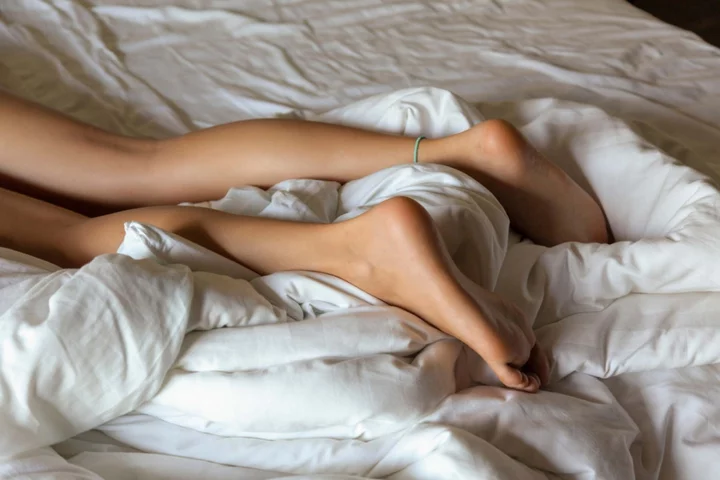
Should you sleep naked? Heatwave myths debunked
It’s safe to say summer has officially started. Temperatures are now firmly above 25C across much of the UK, the sunshine is hotter, noses are stuffy and the air is muggy, sometimes making it difficult to sleep. Keeping cool in a heatwave is a priority – but it also gives rise to various theories and myths on how to achieve this… Sleeping naked cools you down Sleeping naked seems like the easiest and quickest way to cool your body temperature down after being out all day. But this isn’t necessarily the case, according to Abbas Kanani, a superintendent pharmacist at Chemist Click Online Pharmacy. “Sweat collects on the body and remains there when we have no clothes on,” Kanani explained. “Although having less layers on the body can help you to feel more comfortable in the heat, wearing lightweight nightwear made from breathable fabrics helps draw sweat away from your body and makes you feel a lot cooler and more comfortable.” So what should you wear at night to keep cool? “Clothing made from natural fabrics like cotton or linen are breathable and absorbent,” Kanani recommended. “They will soak the sweat up off your skin and they let air through, which cools you down.” People don’t die from heat in this country The UK sun can feel different compared to when you are sunbathing and drinking cocktails on a beach in Barcelona – but that can catch people out. “The biggest myth is that the weather in the UK isn’t hot enough to be dangerous,” said Dr Adam Staten, a clinical director at One Day Tests and NHS GP. “Whilst we don’t have that many really hot days, when it is hot, it can be fatal. For example, during the heatwave last summer, hundreds more people died than normal for that time in the year.” Staten suggests we overcomplicate things when trying to keep cool. “Most measures are really simple and include common sense measures like keeping curtains drawn, keeping windows open or taking cool showers or baths.” Sticking to hot drinks will keep you cool Who else thinks drinking tea or coffee in hot weather will cool you down? For Staten, “One myth that seems to come up a lot is that hot drinks are better for cooling you down than cold drinks. I think the evidence actually shows that it doesn’t really matter – as long as you are keeping hydrated, your drinks can be hot or cold.” Pharmacist Kanani agrees with that final point. “Hydration is vital for keeping cool in hot temperatures. Drink plenty of fluids, especially water, to stay hydrated. Avoid excessive consumption of caffeinated or alcoholic beverages as they can contribute to dehydration.” You only need to wear sunscreen when the sun’s out Another common misconception is thinking that you can’t get sunburnt when it is cloudy outside. “This isn’t true,” Kanani said. “Although it’s less likely than when you’re out in full sunshine, clouds don’t block all of the sun’s UV rays.” It’s also why people either only apply sunscreen in the morning or none at all. “Many people think that when sunscreen is waterproof, it means they do not need to reapply it after swimming or sweating. It should be reapplied straight after you have been in water, towel drying, sweating or when it may have rubbed off.” Sunburn is something to be careful of. Staten said: “It’s really common and can actually be very severe both in the short term and for the longer term risk of skin cancer.” Read More Charity boss speaks out over ‘traumatic’ encounter with royal aide Ukraine war’s heaviest fight rages in east - follow live 7 hay fever hacks to ease your symptoms this summer The pests you really don’t want invading your garden and how to deter them How to take care of your mental health at festivals
2023-06-13 22:51
